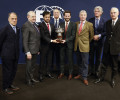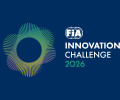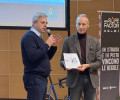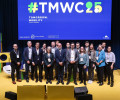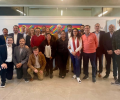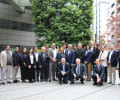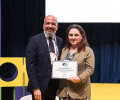FIA SMART CITIES FORUM HONG KONG CHARTS PATH TO URBAN MOBILITY REVOLUTION
For its first edition in Asia, the FIA Smart Cities Forum gathered over 300 participants ahead of the 2019 HKT Hong Kong E-Prix to discuss how disruptive technologies can shape a new urban mobility.
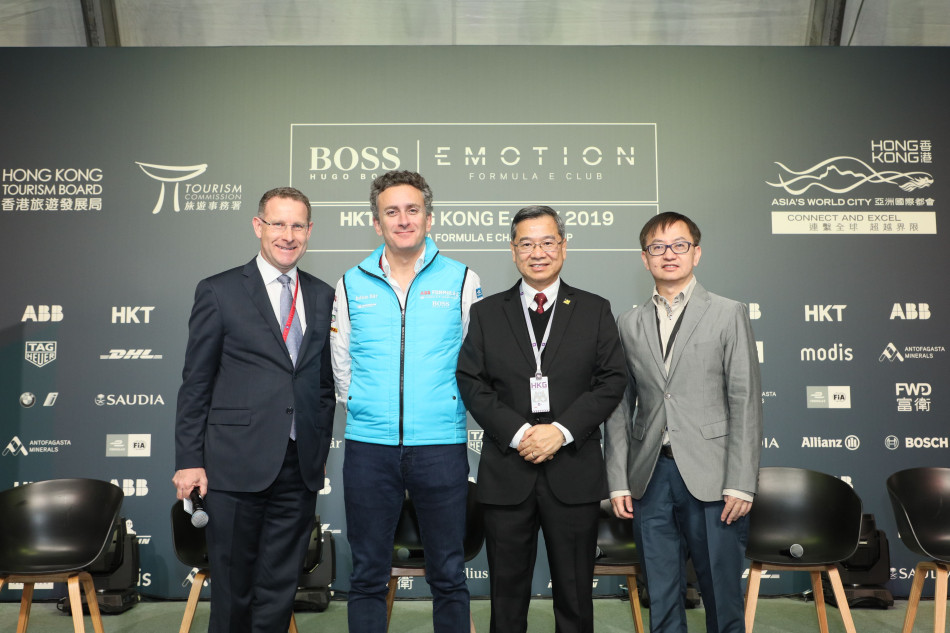
Drones, driverless cars, automated technologies, new mobility services — ground-breaking technologies are changing the way we move in the urban environment. This edition of the Forum focused on how cities are adapting to this new mobility paradigm and how they can embrace this evolution.
To open the Forum, Andrew McKellar, FIA Secretary General for Automobile Mobility and Tourism, emphasised the singularity of the FIA Smart Cities initiative – taking place in tandem with the ABB FIA Formula E Championship, the Forum provides a unique opportunity to discuss the rapid changes in transportation. “FIA Smart Cities demonstrates how we can bring the concepts of Mobility and Sport together in a single platform”, he said before highlighting the importance of the transfer of technologies from the track to the road.
Ringo Lee, President of the Hong Kong Automobile Association, commented on the long-lasting impact of events such as the FIA Smart Cities Forum: “We are grateful that the FIA is running this Forum to enhance synergy between technology and mobility, which represents the future of the automotive industry”.
Dr David Chung, Under-Secretary for Innovation and Technology of the Hong Kong SAR Government, also highlighted the role of exchange platforms to promote innovation and technology: “This is the first time this Forum is being held in Asia, so we are very pleased to participate and to help drive innovation and show how it can change people’s lives. When we look at the urban challenges facing us, without technological solutions, we cannot solve many of these issues.
“As a bureau, we view ourselves as a change agent within Government, to make us ready for the future. The support of FIA and the FIA Smart Cities Forum will help Hong Kong and all cities become more liveable,” he said.
Alejandro Agag, Founder, CEO, and newly appointed Chairman of Formula E Holdings also insisted on the need to drive innovative solutions in the field of mobility. “Since we started Formula E, we wanted to make it more than just a race. The ABB FIA Formula E Championship has a clear objective to promote electric cars and e-mobility and showcase innovation, and forums like this are a very important means of promoting this discussion,” he said.
Reshaping urban mobility requires the development and implementation of new transport modes and infrastructure. By 2040, it is estimated that two-thirds of the world’s population will be concentrated in urban areas with 90% of this growth predicted to take place in Asia and Africa. During her keynote presentation, Marija Zima, Research Team Manager of Power and Energy Systems for ABB, commented on this challenge. “We cannot forget about this rapid growth of the population. When planning the smarter cities of the future, we cannot assume that the situation will be as it is today.The world is accelerating fast. Let’s just think about it - how much additional infrastructure is required to adopt that population increase, and how quickly do we need to be ready for that. Infrastructure development will have to be done faster and smarter.”
Successful urban planning and transportation modernisation can only be achieved through efficient public-private partnerships. Ron Chung, Director of Engineering and Technical Services, Smart Charge (HK) Limited, elaborated the private sector’s view on this sort of cooperation.“We look to the government to set the scene and send the right signals for the private sector. The private sector flourishes with certainty and consistency in policy.”
Iain McBeth, Head of Foresight, Transport for London, highlighted the role of the public sector in fostering reasoned technological developments focusing on user need. “We have a 25-year vision for a zero carbon London. Policy is a key area and one of our priorities is to understand what is out there in other places to see how new tech and business models can be adopted to make us more efficient. The role of the private sector is very important but the key thing for a city is what is the benefit of a technology. Our role is to safeguard Londoners and make sure whatever comes is fundamentally safe, and also something the public will accept. It can’t be tech for tech’s sake.”
The necessity for sustainable mobility solutions to build consumer confidence was further reiterated by Michael Lin from the Massachusetts’s Institute of Technology’s (MIT) Persuasive Electric Vehicles: “We are focused on establishing trust between electric and autonomous vehicles and citizens. We have the opportunity to design new cities now in places like China and India, so why not think about new ways to do this.”
An innovative project led by the Royal Automobile Club of Western Australia – the first driverless vehicle trial in the country’s history – was presented by Patrick Walker, Executive General Manager of Advocacy and Members. For him, the future of urban mobility must be integrated and people-centric, saying “The dream is safe, clean, affordable mobility, but we need a holistic approach in the way we design our cities. We have to plan for the future and determine if we want to design what vehicles will do or where they will go or we let the vehicle dominate.”
The Forum also serves as an incubator for sustainable mobility innovators worldwide through its FIA Smart Cities Global Start-Up Contest: ‘A Vision for the Future’ with two finalists, Moovaz and NOHMs Technologies Inc. presenting their concepts to the Forum guests.
Taking place a day ahead of the 2019 HKT Hong Kong E-Prix, all Forum participants also had a chance to see some of Formula E’s latest innovations in sustainable mobility up close and in person when they participated in a pit lane walk and visited the garages of the 11 teams competing following today’s Forum.

 Facebook
Facebook Twitter
Twitter
